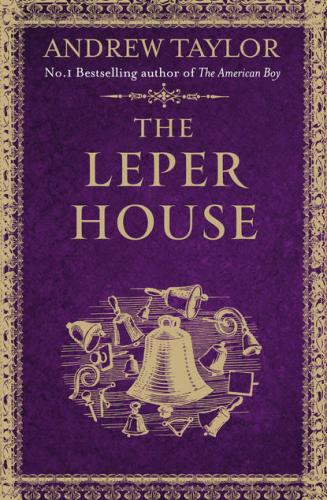ANDREW TAYLOR
The Leper House
Published by HarperCollinsPublishers Ltd
1 London Bridge Street
London SE1 9GF
First published in Great Britain by HarperCollinsPublishers 2016
Copyright © Andrew Taylor 2016
Cover design by Dominic Forbes © HarperCollinsPublishers Ltd 2016
Andrew Taylor asserts the moral right to be identified as the author of this work.
A catalogue record for this book is available from the British Library.
This novel is entirely a work of fiction. The names, characters and incidents portrayed in it are the work of the author’s imagination. Any resemblance to actual persons, living or dead, events or localities is entirely coincidental.
All rights reserved under International and Pan-American Copyright Conventions. By payment of the required fees, you have been granted the non-exclusive, non-transferable right to access and read the text of this e-book on-screen. No part of this text may be reproduced, transmitted, down-loaded, decompiled, reverse engineered, or stored in or introduced into any information storage and retrieval system, in any form or by any means, whether electronic or mechanical, now known or hereinafter invented, without the express written permission of HarperCollins e-books
Source ISBN: 9780008171230
Ebook Edition © JULY 2017 ISBN: 9780008179762
Version: 2017-06-19
Table of Contents
Somewhere along the way, Mary mislaid her religion. The funeral was a humanist affair in a chapel, or whatever they call it, attached to a crematorium. There must have been nearly two hundred mourners. She had been only thirty-eight when she died, which is why her death touched so many lives – and why there was a sense of outrage in the air, rather than resignation.
Alan himself acted as master of ceremonies. He was used to public speaking and chairing meetings – he was the headmaster of a school about fifteen miles from Norwich. He kept his emotions as firmly in check as the timing.
‘How brave,’ whispered one of my neighbours.
‘He’s bearing up wonderfully,’ said a friend. ‘Especially when you think—’
‘He has to be brave for the children.’
The friend nodded. ‘At least her poor parents are dead.’
The coffin was at the end of the room. It was one of those environmentally friendly ones, designed to make a posthumous statement of faith in the possibility of a greener world to come, as it slid towards its complete destruction in the furnace. It had nothing to do with the Mary I remembered most vividly: the sideways glances, the grazed knees and the shrill giggles.
Alan took us through Mary’s life at a brisk pace – we had a time slot at the crematorium, and death waits for no one. He described our parents – a nurse and an estate agent, respectively – and the loving upbringing they had given her. He talked about her pet rabbit, Matilda, and our old dog, who recognized her step even when he was old and blind. (Alan did not mention the dog’s incontinence and appallingly bad breath.) He talked about their meeting at university, the rocky road of their romance and the happy years of their marriage. He waxed lyrical about the dedication she had brought to her career as a primary teacher and the devotion her pupils gave her in return. Finally, by way of peroration, he talked of their children, Matthew and Alice, as the crowning joys of her life.
The children were sitting in the front row. I had caught a glimpse of them as they came in. They both looked like Alan, poor kids, all long nose and small chin; there was not a trace of Mary. Maybe that was no bad thing.
What else? We had two readings, one by a teacher colleague of Mary’s (something vaguely uplifting from Kahlil Gibran) and another by an old boyfriend whose face was faintly familiar (Elizabeth Barrett Browning’s ‘How do I love thee? Let me count the ways …’). We sang, or mouthed, Blake’s ‘Jerusalem’, on the tacit understanding that it had somehow been purged of its religious connotations.
